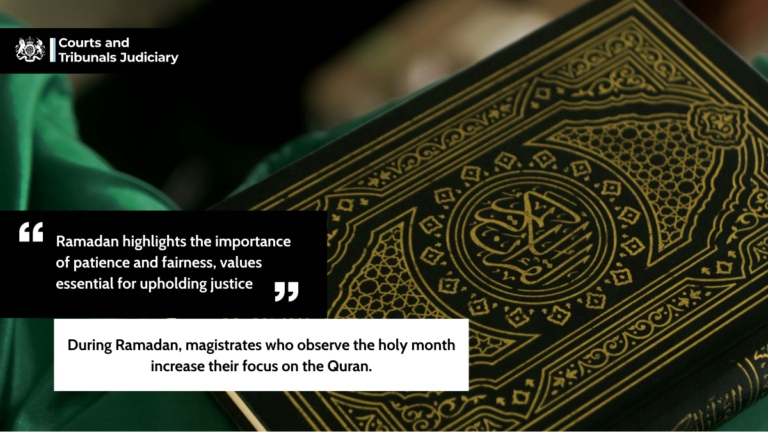Ramadan reflections: Insights from magistrates

Observed annually by Muslims worldwide, Ramadan represents a sacred period marked by fasting, prayer, and charitable acts. We spoke to three magistrates about what this period means to them and how it aligns with their role as a magistrate.
Waqar

For me, Ramadan is not just a month on the Islamic calendar; it’s a sacred time filled with spiritual significance and reflection. During this holy month, I find myself deeply immersed in spiritual growth and self-reflection. It’s a time when the community comes together in worship, breaking fasts with loved ones and sharing in the blessings of the month.
I believe that the teachings of Ramadan, like self-discipline and fairness, intertwine with the principles of the magistracy, and highlight to me the importance of upholding the rule of law and ensuring fair treatment for all individuals.
I am grateful for the flexibility shown by the court rota team. The team are understanding of my religious observances, which allows me to fulfil my duties. This inclusive approach, followed by magistrates across England and Wales, encourages an environment where individuals like me can fully engage in their religious practices while upholding their professional responsibilities.
Usman

In my experience, Ramadan is a time of heightened compassion, where the focus shifts towards reflection, self-discipline, and empathy towards others. I believe that Ramadan is a time of increased generosity and it allows me to foster a deeper connection with my spirituality.
Navigating my responsibilities in the magistracy during Ramadan involves upholding justice while staying true to the spiritual principles of the month. In situations of injustice, I believe that Islam advocates for the rights of others.
During court proceedings, my colleagues show understanding and support, and I acknowledge their understanding around my religious observances, such as taking breaks for prayer when necessary. I also feel comfortable seeking breaks or pauses during court proceedings if needed, and am happy I work in an inclusive environment promoted by colleagues who understand Ramadan.
Mariam

Ramadan serves as a catalyst for spiritual growth and self-discipline for me. It highlights the importance of patience, integrity, respect, empathy, and fairness, which are essential for upholding justice within the judicial system. Ramadan powers my motivation and patience, and I’ve always thought it’s a great driver for my learning and fostering a culture of sharing and giving.
I appreciate my colleagues’ understanding of Ramadan and flexibility around religious practices within the workplace. Having just been in court this last week, it’s been really lovely to see my colleagues take the time to understand a little more about what Ramadan consists of.
The magistracy does a great job in promoting diversity and an inclusive environment, including flexibility around religious practices with prayer facilities, respecting religious attire and communications that draw attention to religious observations.
How Ramadan links to the magistracy
Ramadan, for magistrates like Waqar, Usman, and Mariam, is not just a personal spiritual journey, it also connects with their professional responsibilities. During this time, they emphasise values which are crucial for upholding justice.
Become a magistrate
If becoming a magistrate sounds like something you are interested in, check for availability in your area.
